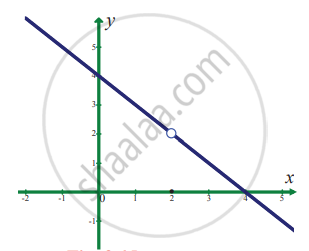Advertisements
Advertisements
प्रश्न
Verify the existence of `lim_(x -> 1) f(x)`, where `f(x) = {{:((|x - 1|)/(x - 1)",", "for" x ≠ 1),(0",", "for" x = 1):}`
उत्तर
Given `f(x) = {{:((|x - 1|)/(x - 1)",", "for" x ≠ 1),(0",", "for" x = 1):}`
`f(x) = {{:(|(x - 1|)/(x - 1), "for" x < 1 and x > 1),(0, "for" x = 1):}`
`f(x) = {{:((- (x - 1))/(x - 1), "for" x < 1),((x - 1)/(x - 1), "for" x > 1),(0, "for" x = 1):}`
`f(x) = {{:(-1, "for" x < 1),(1, "for" x > 1),(0, "for" x = 1):}`
`f(1^-) = lim_(x -> 1^-) f(x)`
= `lim_(x -> 1^-) (- 1)` = – 1 .......(1)
`f(1^+) = lim_(x -> 1^+) f(x)`
= `lim_(x -> 1^+) (1)` = 1 .......(2)
From equations (1) and (2) we get
f(1–) ≠ f(1+)
∴ The limit of f(x) does not exist.
APPEARS IN
संबंधित प्रश्न
In the following example, given ∈ > 0, find a δ > 0 such that whenever, |x – a| < δ, we must have |f(x) – l| < ∈.
`lim_(x -> 2) (x^2 - 1)` = 3
Evaluate the following :
`lim_(x -> 0)[x/(|x| + x^2)]`
Evaluate the following :
`lim_(x -> 0) [(sqrt(1 - cosx))/x]`
In exercise problems 7 – 15, use the graph to find the limits (if it exists). If the limit does not exist, explain why?
`lim_(x -> 2) f(x)` where `f(x) = {{:(4 - x",", x ≠ 2),(0",", x = 2):}`
Evaluate the following limits:
`lim_(x -> 2) (x^4 - 16)/(x - 2)`
Evaluate the following limits:
`lim_(x ->) (x^"m" - 1)/(x^"n" - 1)`, m and n are integers
Evaluate the following limits:
`lim_(x -> 1) (sqrt(x) - x^2)/(1 - sqrt(x))`
Evaluate the following limits:
`lim_(x -> 0) (sqrt(1 + x) - 1)/x`
Evaluate the following limits:
`lim_(x - 0) (sqrt(1 + x^2) - 1)/x`
Evaluate the following limits:
`lim_(x -> oo)(1 + 1/x)^(7x)`
Evaluate the following limits:
`lim_(x -> oo)(1 + "k"/x)^("m"/x)`
Evaluate the following limits:
`lim_(x -> 0) (tan 2x)/x`
Evaluate the following limits:
`lim_(x -> 0) (1 - cos^2x)/(x sin2x)`
Evaluate the following limits:
`lim_(x - oo){x[log(x + "a") - log(x)]}`
Choose the correct alternative:
`lim_(x - pi/2) (2x - pi)/cos x`
Choose the correct alternative:
`lim_(x - oo) sqrt(x^2 - 1)/(2x + 1)` =
Choose the correct alternative:
`lim_(x -> 0) (8^x - 4x - 2^x + 1^x)/x^2` =
Choose the correct alternative:
`lim_(x -> 0) (x"e"^x - sin x)/x` is
Choose the correct alternative:
The value of `lim_(x -> 0) sinx/sqrt(x^2)` is
